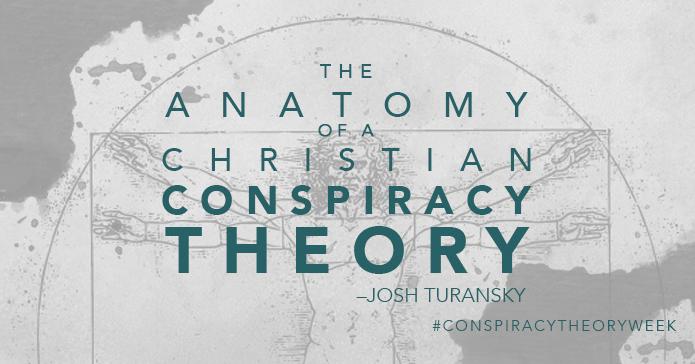“Rick Warren promotes Chrislam.” “Billy Graham is a Freemason of the 33rd degree.” And pigs fly. I’m sure you’re seeing the crazy things that float around the Internet too. Unfortunately, part of my job is to read these insane theories, accusations, and conspiracies and block those who perpetuate them on our church’s social media sites. Most of the times I’m able to laugh and shake my head, but when I see them shared across Facebook, I feel sad.
Paul told Timothy, “But refuse and avoid irreverent legends (profane and impure and godless fictions, mere grandmothers’ tales) and silly myths, and express your disapproval of them. Train yourself toward godliness” (1 Tim. 4:7 AMP).
There are a group of Internet personalities who think they have a special dispensation of discernment about everything under the sun. And if that weren’t bad enough, they start websites to host their theories. Amazingly, most of them stay anonymous, use lime-green lettering on a black background, and love pictures of dragons. Often the loudest people on the Internet have the least to lose—and this group is no different. Maybe you are a leader that has been a victim of their attack. Whether we want to compare them to Sanballat and Tobiah hassling Nehemiah as he rebuilt Jerusalem or compare them to the little foxes spoken of in Song of Solomon that ruin the vineyard of love, they are real and they hurt Jesus’s church.
I recently discovered that there is a recipe for creating a conspiracy theory. There are at least five ingredients that can be used to create a good one. Here they are:
- Guilt By Association
If one can connect the personality or ministry to the Devil himself, then they will be well on their way to generating a good conspiracy.
Now, not many Christian leaders have been caught on film shaking hands with Satan, so one may have to go with the second best thing: a picture with the Pope. Or maybe a link can be established with an organization where the leader is a part of the Muslims. One way or another, the leader or ministry is associated with something absolutely evil. Never mind the fact that Jesus ate with gluttons and was a friend to tax collectors and sinners.
- Guilt By Silence
“Can you believe he left the Gospel out of his book? He must be a heretic.” That is exactly how one lady made her case when she called to complain about a local Christian leader, trying to convince me that this leader was a heretic. It was guilt by silence. Once I applied that logic to her own life, she cut the call short. We can all Monday-morning-quarterback the Christian leaders around us, but that doesn’t make them guilty of a crazy conspiracy.
- Guilt By A Mistake
Recently a popular pastor made a significant mistake in his sermon when he said that Muslims and Christians follow the same God. Anyone, though, who listened to the entire sermon or his other messages would have known that it was just a mistake of miscommunication. But no, the five-minute clip from his sermon was isolated and then passed around the Internet. It was guilt by mistake. And yes, he was guilty of a mistake, but not guilty of a sinister scheme to promote Chrislam. Forget the generous mercy we wish to be shown when we make mistakes too. No, their mistake is the ammo needed to build a case against that leader.
- Guilt By Taking Statements Out Of Context
With a little help from Photoshop or audio editing software, it is fairly simple to take stuff out of context. A freeze-frame here or a sound bite there can make great fodder for a conspiracy. Once the quote or image is out of context, it can be paired with another and then another, and pretty soon we have a series of damning quotes that support the theory upon which it is built. Many then fail to see that the intended meaning of the author has been completely twisted. The only thing that matters is that the case gets made.
- Guilt By Implication
Half a cup of assumption…. If a good quote can’t be taken out of context, just read between the lines. Who needs an actual quote anyway? Just interpret what they really mean—exerting a great amount of self-confidence. But hey, the case needs to be made. People need to be protected from these evil leaders.
To conclude, it isn’t that difficult to find these five elements upholding these conspiracy theories floating around. These online so-called “discernment” websites thrive on the Internet because of its detachment from reality, just enough to make these hypotheses possible. As just stated from this list, most conspiracy theories require a person to disengage from real life to some degree or another.
Therefore, it is vital that our church understand that being a pharisaical watchdog is a false form of spirituality. It is an empty supplement for true Christian fruit. It can feel very biblical to be the “discerner” looking down our noses at the people around us, but it is only biblical in the sense that was how the Pharisees behaved.
Therefore, preparing your minds for action, and being sober-minded, set your hope fully on the grace that will be brought to you at the revelation of Jesus Christ.
(1 Pet. 1:13 ESV)
Josh Turansky is the author of this article and pastor at Calvary Chapel of Costa Mesa located in Costa Mesa, CA. Please visit his website. Also, follow Josh on Twitter @JoshTuransky.






this was a good read.